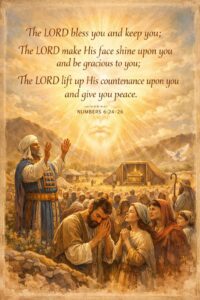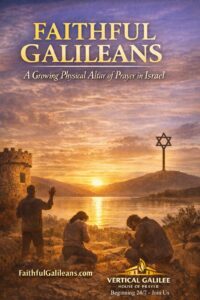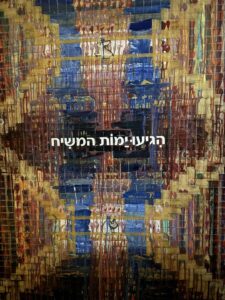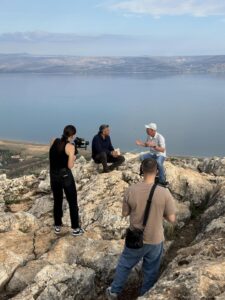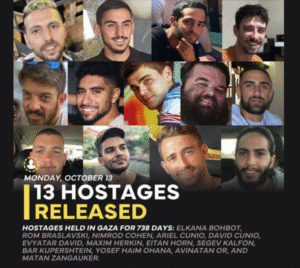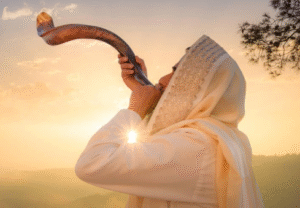
Elohim's Covenant with Israel, the Galileans' Sacrifice, and the Promise of Restoration
The covenant between the Elohim and Israel has shaped the history, beliefs, and identity of His people. Throughout the Tanakh (Old Testament), we see Elohim’s commitment to the people of Israel, assuring them of His everlasting covenant, promising protection, restoration, and blessings in times of trouble. These promises are fulfilled through His hand, guiding Israel through adversity, bringing them back to the land, and establishing a new covenant with them. In Isaiah, Ezekiel, and Jeremiah, we find powerful prophecies concerning the end times and the restoration of Israel. Additionally, we see the example of the Galilean apostles who carried forward this promise with unwavering faith, enduring persecution and martyrdom.
Isaiah’s Vision of Peace and Comfort
In the book of Isaiah, Elohim declares a profound promise of comfort to His people, especially concerning the ultimate peace that will flow like a river through Jerusalem:
“כִּי כֹה אָמַר יְהוָה, הִנְנִי נֹטֶה אֵלֶיהָ כְּנָהָר שָׁלוֹם וּכְנַחַל שׁוֹטֵף כְּבוֹד גּוֹיִם; וִינַקְתֶּם, עַל-צַד תִּנָּשֵׂאוּ וְעַל-בִּרְכַּיִם תְּשָׁעֲשָׁעוּן” (ישעיהו ס”ו:י”ב).
“For thus saith the LORD, Behold, I will extend peace to her like a river, and the glory of the Gentiles like a flowing stream: then shall ye suck, ye shall be borne upon her sides, and be dandled upon her knees” (Isaiah 66:12).
Here, Elohim promises to extend peace to Jerusalem, bringing comfort to His people just as a mother comforts her child. This peace is not mere tranquility but a divine, nurturing peace that envelops Israel and its people in His love and protection. Elohim’s people, though scattered and surrounded by enemies, will find peace and strength in Him, and Jerusalem shall be a place of refuge and renewal.
Ezekiel’s Prophecy of Gog and Magog
In Ezekiel chapters 38 and 39, the prophet presents a vivid image of the future battle involving Gog and Magog—a coalition led by Russia, accompanied by nations like Persia (Iran), Cush (Sudan), Put (Libya), Gomer (Northern Russia), and Beth Togarmah (Turkey), all rising against Israel. This coalition’s motives are sinister, aimed at invading Israel, yet Elohim assures His people of a victorious outcome.
כִּי-אָנֹכִי מוֹלִיךְ אוֹתְךָ, וְשַׂמְתִּי הוֹקִים בִּלְחָיֶיךָ וְהוֹצֵאתִי אוֹתְךָ, וְאֶת-כָּל-חֵילֶךָ (יחזקאל ל”ח:ד).
“I will turn you around, put hooks in your jaws, and bring you out with your whole army” (Ezekiel 38:4).
The Elohim uses an interesting metaphor of “hooks in your jaws,” suggesting that He will draw these nations into battle, ultimately revealing His greatness. By allowing this invasion, He displays His power and His commitment to defend Israel. In the climactic verses, Elohim declares:
וְנָשָׂאתִי יָדִי עַל הָעַמִּים וְיָדְעוּ כִּי-יְהוָה אֲנִי, בְּקָדְשִׁי (יחזקאל ל”ח:כ”ג).
“I will show my greatness and holiness and make myself known in the sight of many nations” (Ezekiel 38:23).
These events emphasize Elohim’s sovereignty, as He intervenes supernaturally, raining down torrents of rain, hailstones, and burning sulfur on the enemy forces (Ezekiel 38:22). The battle serves not only to protect Israel but also to demonstrate to all nations the sanctity and power of Elohim.
The Role of Michael and Israel’s Divine Protection
Daniel 12:1 describes the role of the Archangel Michael in protecting Israel. As the leader of Elohim’s heavenly armies, Michael stands guard over the people, symbolizing divine intervention in times of trouble:
“וּבָעֵת הַהִיא יַעֲמֹד מִיכָאֵל הַשַּׂר הַגָּדוֹל הָעֹמֵד עַל-בְּנֵי עַמֶּךָ” (דניאל י”ב:א).
“At that time, Michael, the great prince who stands watch over the sons of your people, will arise” (Daniel 12:1).
Israel, despite facing numerous threats, remains under the protection of the heavenly armies, reassured by Elohim’s promises and the presence of Michael. This divine protection is woven throughout Israel’s story and extends into the prophetic future, where Elohim’s hand will be revealed in dramatic ways.
The Galileans’ Sacrifice and Martyrdom for the Faith
The early apostles, particularly the Galileans, embodied the dedication to Elohim’s covenant, even unto death. They spread the message of Yeshua with faith and resilience. Peter, for example, was crucified upside down in Rome, feeling unworthy to die in the same manner as Yeshua. James, the son of Zebedee, was beheaded in Jerusalem, becoming one of the first martyrs for the faith. Each apostle paid the ultimate price, reflecting their unbreakable bond with Elohim and their commitment to His message.
These Galilean apostles serve as powerful examples of sacrifice, embodying the call to bear one’s cross (Matthew 10:38). Their stories inspire believers to stand firm in faith, regardless of persecution, and they emphasize the importance of unwavering dedication to Elohim’s mission for His people.
The Sanctity of Marriage as an Illustration of Elohim’s Love for His People
In Ephesians 5:21-33, the relationship between husband and wife symbolizes the kehilah’s relationship with Yeshua. Husbands are called to love their wives as Yeshua loved the kehilah, laying down His life in sacrificial love:
וְאַתֶּם אֲנָשִׁים, אֶהֱבוּ אֶת נָשֵׁיכֶם כְּמוֹ שֶׁאֲהֵב הַמָּשִׁיחַ אֶת הַקְּהִלָּה וּמָסַר אֶת עַצְמוֹ בַּעֲדָהּ (אפסים ה’ 25).
“Husbands, love your wives, even as Christ also loved the church, and gave himself for it” (Ephesians 5:25).
This covenantal relationship between husband and wife mirrors Elohim’s covenant with Israel. It speaks to loyalty, sacrifice, and unwavering devotion. Just as a husband and wife are bound in unity, Elohim binds Himself to His people, promising never to abandon them. In Malachi 2:14-17, Elohim condemns those who deal treacherously with their spouses, using this as an analogy for unfaithfulness in covenant relationships.
Historical Antisemitism and the Marking of Jewish Identity
The Jewish people have faced persecution and stigmatization throughout history, often marked visually by distinctive clothing mandated by hostile societies. In medieval Europe, Jews were required to wear yellow badges or hats, a practice intended to mark them as separate and subordinate. Similarly, in Islamic territories, Jews had to wear yellow headgear, such as turbans, to visibly distinguish themselves from others. These practices continued under various regimes, with Nazi Germany enforcing the infamous yellow Star of David. Such outward markers enforced by antisemitic authorities symbolized attempts to marginalize and dehumanize Jewish communities.
These visible marks of discrimination stand in contrast to Elohim’s covenantal mark upon His people, a mark that signifies His love and promises rather than exclusion or hatred. They remind us of the resilience of the Jewish people, who, despite attempts to marginalize and separate them, have continued to uphold the covenant of Elohim.
Living a Life Set Apart for Elohim
The Scriptures continually emphasize the need for separation from unrighteousness, stressing that light has no fellowship with darkness (2 Corinthians 6:14-16). Followers of Elohim are called to be holy, to reflect His nature, and to live lives of righteousness:
כִּי אֲנִי יְהוָה, אֱלֹהֵיכֶם: וְהִתְקַדִּשְׁתֶּם, וִהְיִיתֶם קְדוֹשִׁים–כִּי קָדוֹשׁ, אֲנִי (ויקרא י”ט:ב).
“Be ye holy, for I am holy” (Leviticus 19:2).
This calling is not just an obligation but an invitation to enter into Elohim’s presence and to live in a manner that honors Him. It is a lifestyle of separation, not out of legalism but out of love and respect for Elohim’s ways.
The New Covenant and Elohim’s Law Written on Our Hearts
Elohim’s plan for His people culminates in the new covenant, as prophesied by Jeremiah. This covenant signifies a profound transformation, where His laws are no longer external but internalized:
“כִּי-זֹאת הַבְּרִית אֲשֶׁר אֶכְרֹת אֶת-בֵּית יִשְׂרָאֵל, אַחֲרֵי הַיָּמִים הָהֵם נְאֻם-יְהוָה; נָתַתִּי אֶת-תוֹרָתִי, בְּקִרְבָּם, וְעַל-לִבָּם אֶכְתְּבֶנָּה” (ירמיהו ל”א:ל”ג).
“But this shall be the covenant that I will make with the house of Israel; After those days, saith the LORD, I will put my law in their inward parts, and write it in their hearts” (Jeremiah 31:33).
Elohim’s desire is for His people to know Him deeply, not just through rituals but through a heartfelt relationship. This covenant is fulfilled in Yeshua, who enables us to walk in Elohim’s ways by the Spirit.
Sacrifice and Obedience as Expressions of Faith
The ultimate expression of faith and commitment to Elohim is often found in sacrifice and obedience. Abraham’s willingness to offer his son Isaac on Mount Moriah exemplifies the kind of faith Elohim desires (Genesis 22:1-19). This act of obedience prefigures Yeshua’s sacrifice, illustrating that true worship involves surrendering everything to Elohim.
Yeshua reminds us of this in Matthew 10:38:
“וּמִי שֶׁאֵינוֹ נוֹשֵׂא אֶת-צְלָבוֹ וְהוֹלֵךְ אַחֲרַי, לֹא רָאוּי הוּא לִי.”
“And he that taketh not his cross, and followeth after me, is not worthy of me” (Matthew 10:38).
As believers, we are called to follow Yeshua’s example, taking up our own crosses in a life of sacrifice and obedience.
Conclusion: The Fruit of the Spirit and the Covenant of Life
Through our journey with Elohim, we are invited to bear the fruit of the Spirit (Galatians 5:22-23), embodying love, joy, peace, patience, kindness, goodness, faithfulness, gentleness, and self-control. These fruits are not just traits but expressions of a life rooted in Elohim’s covenant.
In these hard times, as we witness the unfolding of prophecies and the gathering of nations against Israel, let us remember Elohim’s covenant with His people. This covenant, fulfilled in Yeshua, calls us to a life of holiness, love, and dedication. Let us stand firm, pray for Israel, and remain faithful, for Elohim is with His people, and His promises are everlasting. Elohim is faithful, and His covenant endures forever
SEEK HIS FACE CONTINUALLY
SEEK HIS FACE CONTINUALLY Light, Grace, Presence, and the Face of Elohim The heart of…
Fasting, the Heart, and the Return to Elohim
Fasting, the Heart, and the Return to Elohim A Hebraic understanding of Consecration, Repentance, and…
Ein yi’ush ba-olam klal
Ein yi’ush ba-olam klal אין ייאוש בעולם כלל“There is no despair in the world at…
FROM PROVISION TO PRESENCE
FROM PROVISION TO PRESENCE THE WAY OF THE MESSIAH, THE DWELLING OF ELOHIM, AND THE…
The Circle of Authority, the River of Life, and the Kingdom of the Messiah
The Circle of Authority, the River of Life, and the Kingdom of the Messiah Encountering…
Hanukkah Light, Sonship, and Covenant Faithfulness
Hanukkah Light, Sonship, and Covenant Faithfulness Why the Sons of Elohim Must Not Shrink Back**…
Hanukkah: Shining the Light on Our Thoughts
Hanukkah: Shining the Light on Our Thoughts How Thoughts Enter Our Lives, Shape Our Hearts,…
The Lamb, Mount Zion, and the Mystery of the Song
The Lamb, Mount Zion, and the Mystery of the Song The Lamb, Mount Zion, and…
Awake, O Sleeper — The Five-Alarm Fire of Awakening
Awake, O Sleeper — The Five-Alarm Fire of Awakening May we hear Elohim like Shmuel…
Anointed to Heal, Restore, and Rebuild: A Prophetic Call to the Kehilah
Anointed to Heal, Restore, and Rebuild: A Prophetic Call to the Kehilah The Anointing of…
What is called the "Gaza War"
What is called the “Gaza War” In which Israel faced attacks on 7 different military…
Why Do the Nations Rage?
Why Do the Nations Rage? (Psalm 2, Prophetic Scriptures, and Our Hope in Yeshua the…

